- Home
- Al Sarrantonio
Summer Cool - A Jack Paine Mystery (Jack Paine Mysteries) Page 5
Summer Cool - A Jack Paine Mystery (Jack Paine Mysteries) Read online
Page 5
Before they entered, Paine helped Billy pull the tin slit back away from the dome. It was big inside, bigger than Paine's own observatory, and the telescope was bigger, a huge cannon-like white Newtonian with a sixteen-inch mirror cradled at the bottom end.
"Gonna try something," Billy said, studying his watch in the near dark, snapping on the red map light near the top of the step ladder used to view through the top end, where the eyepieces went. "Shit, we almost missed it."
Paine helped him move the dome around on its ball bearings. It squeaked and rumbled as the slit circled the sky from east to south. Rader quickly set the stepladder in place, climbed to the top, dropped a powerful eyepiece into place and put his eye against it.
"Thought I could eyeball it, but I'd better set the circles," he said, scrambling down the ladder and consulting the two large setting circles on the telescope's mount, etched with degree marks, by which the scope could find any point in the sky.
"Got it now for sure," Rader said, giving a small grunt of pleasure as he refocused the eyepiece. "Come on up here, Jack."
Billy stood aside, as Paine crowded next to him to look into the eyepiece. He adjusted the focus slightly.
"Jesus."
An explosion of light came into sharp view. A huge, frightening, awesomely packed globe of millions upon millions of pinpoint stars, densely packed to the point of white heat at the center, flowing outward in all directions until tiny, individual stars, each a miniature sun, focused like gems against the black sky.
"Omega Centauri," Billy Rader said. "The biggest fucking globular cluster in the sky. You can't see that sucker in New York, Jack. I can only see it here way low through a couple of trees a little while every night."
As Rader was saying this, the spectacular sight began to fade behind the low hills.
"Let me have a last look," Rader begged, pulling Paine away from the eyepiece.
"You deserve it," Paine said.
Sometime toward dawn, as the distinctive cross of the constellation Cygnus, the Swan, sank toward the western horizon, Billy Rader lit a cigarette and asked Paine, "So tell me how you've been."
"I can always tell when you get serious because you light a cigarette," Paine said.
In the red light of the map light, Rader shrugged. "Heard some bad things about you a little back. Sounded like it was tough."
"It was," Paine said.
"She really got to you that bad?" Billy Rader asked.
Paine hesitated, pulling away from the eyepiece, in which the stately Andromeda galaxy, now overhead, floated like a majestic whirlpool of soft light. "Yes, she did," he said quietly.
Bader nodded, pulled at his cigarette. "It was like that with Janet and me for a while, before we busted up. It's bad enough when they get a hook into your crotch, but when they land it in your gut it's much worse. Like they take a piece of your soul away and keep it."
"It was never like that with Ginny and me."
Bader waved his cigarette, making a line of light with the glowing end. "Just because you marry a woman doesn't mean she has the hook in your gut. Sometimes she gets it in there later, sometimes not at all. Most men, I don't think they know what the fuck they're doing when they get married. It's like they go blind for a little while. Then they wake up. Sometimes they're lucky, and when they wake up the hook is in deep and they can be happy. The rest of us . . ." He shrugged. "Why do you think the divorce rate is so high, Jack? It's because the hook was somewhere, in the groin, in the pocketbook, but it wasn't in the gut. That only happens rarely, Jack. Sometimes the hook falls out later, like it did with Janet and me. I can't fucking explain it."
"Neither can I."
Billy was hesitant again. "It's just that I heard you and this woman. . ."
"Rebecca."
"Well, I heard you almost killed yourself after she did."
"I thought about it, Billy. But that wasn't the first time. I don't think I'll be thinking about it much again."
That seemed to be what Billy Rader had been digging for, and Paine was happy he had found it. Bader threw down his cigarette, and Paine watched the glow snuff out under Rader's boot.
"I imagine that don't make getting over her any easier."
"In a way, it does."
"Oh," Billy Bader said. Then he said, "Let's have one more look at the Ring Nebula in Lyra, then we'd better close this sucker up and get you to the airport. Landers means what he says. But that don't mean," Rader continued, "that a good ole Texan like me can't keep looking around a little for what you need to know."
"Thanks, Billy," Paine said as dawn began to rise. "I was just about to ask."
Later, as the plane climbed up in the new hot day that would get hotter, as Paine laid his head back and watched Texas fall beneath him from the window, he thought of the Ring Nebula. A gently glowing circle of yellow-orange gas, it very much resembled a ring in the darkness. A ring meant many things. Sometimes it meant emptiness. He had worn a ring on his left hand once, and he had taken it off and the space in the middle of it had been his marriage to Ginny. He had never given Rebecca a ring.
Terry Petty wore a ring, a thin round sliver of yellow-orange gold that encircled her finger. He knew she had a hook in her gut. The ring, therefore, was not just a circle of metal but a symbol of an inviolable, mysterious process. Her finger made the ring whole; there was no emptiness in its center.
Bobby Petty had been a lucky man with, it had seemed, a very large hook in his gut. Paine thought of the headless man in the motel toilet, the look of astonishment in the eyes. Many things could cause astonishment, including the betrayal of a friend, and the stark, sudden viciousness of a cold enemy.
Paine wondered if Petty still wore his ring, or if it had been taken from his finger, becoming only a hole in space signifying, as hard as it was to believe, the destruction of the essential self, the dropping of the hook, and, finally, mere and utter emptiness.
10
Paine saw the two men standing awkwardly near the entrance to his building when he went in, so he wasn't surprised when they came into his office. They still looked awkward coming in. One of them glanced behind him nervously, so Paine reached beneath his desk and turned on a switch that activated his hidden tape recorder.
"Can I help you?" Paine asked.
One of them, who was thin and tall with curly light hair and a mustache, closed the door to Paine's office and stood with his hands folded in front of him. The thin one looked at the other one, who was stocky and slightly muscled, with dark hair and eyes, and the stocky one shuffled to Paine's desk and tried to look mean. He looked more nervous.
"We're here to talk to you," he said, gruffly.
"So talk," Paine said.
The gruff one looked at the thin one with the mustache, who shuffled his feet and looked down. The stocky one put the flats of his hands on Paine's desk and leaned on it.
"Someone sent us."
"Who?"
"Jeez, it's hot in here," the one by the door suddenly said. He looked at Paine a moment and then looked back down at the floor.
"We want you to vacate the building," the gruff one said.
"Excuse me?" Paine said.
"Move out," the one by the door added quickly.
The gruff one began to move around the desk toward Paine, and now the one by the door came briskly away from it and approached Paine from the other side. The two of them had finally made up their minds. The stocky one reached into his pocket, removed a short length of brass tube, and wrapped his fingers around it into a fist. The skinny one with the mustache had his wide eyes riveted on Paine now, his hands balling into fists.
The skinny one reached for Paine first, and Paine stood and came up at him under the chin. The man made a surprised sound and then Paine turned his attention to the one with the pipe under his knuckles. As expected, he tried to use that fist first and Paine easily ducked way from it, crouching and throwing a solid blow into the man's crotch. He groaned and sat down heavily on the floor. His ha
nd opened, the pipe rolling away, and he clutched at his privates.
The skinny one decided to try again. Paine was on him quickly, kicking him hard in the knee as he rose, and the man grabbed at his knee and yelled and Paine hit him again. Paine kicked him sharply in the right side as he lay out flat on the floor and that seemed to be it for him.
The stocky one had not quite given up, he was on all fours, trying to rise, so Paine kicked him twice in quick succession in the rib cage and that was the end of it.
Paine stood over them and said, "You guys wanted to talk to me?"
"Jesus," the stocky one groaned; the thin one with the mustache said, "Shit."
"Let's talk," Paine said. "Tell me who sent you."
The stocky one shook his head dully, so Paine kicked him again in the ribs.
"Jesus!" he said. "Stop it!"
"Tell me who sent you."
"I can't," the stocky one said. Paine made sure the skinny one was watching and he kicked the stocky one again, harder, and the stocky one screamed.
Paine went to the other one and said, "Tell me who sent you."
"Please, let's just forget it," the skinny one said.
"You saw what I did to your friend?"
The man nodded.
Paine kicked him smartly in the side.
"Anapolos sent us!" the skinny one said.
"Who are you?" Paine asked.
The skinny one was moaning, lying on his back, holding his side. "Jesus!"
"You're not Jesus," Paine said. He cocked his foot back and the skinny one stopped moaning long enough to say, "Koval. My name's Koval."
"Who's he?" Paine asked, pointing to the stocky one.
"Kohl," Koval said. "His name's Richie Kohl."
"What do you have to do with Anapolos?"
Richie Kohl had rolled up into a sitting position, arms around his knees. He looked grouchy and hurt. "We live in his building in Easton."
"Pennsylvania?" Paine said. "Anapolos owns a building in Easton, Pennsylvania?"
Koval, the skinny one, nodded. "Two buildings. They're pigsties."
"And what are you if you live in them?"
"We owe him rent," Kohl said.
"Get up," Paine said.
They both rose, warily.
"Here's the story," Paine said. He reached under his desk, turned off the tape recorder. "I see you around here again, I bust your heads. Then I get you arrested. I want you to tell Anapolos he's a scumbag. Got that?"
They nodded, looking like schoolboys caught stealing milk money.
"And if it helps," Paine said, as they slouched toward the door, "You don't owe Anapolos rent anymore. In fact, you've got the next six months rent free."
Koval and Kohl looked at Paine blankly.
"Get out," Paine said.
Paine closed the door behind them, and turned on his message machine.
Chief Bryers' voice was on the tape immediately. It said, "Paine, call me." The rest of the tape was empty.
Paine punched the number in, and was put through immediately.
"Paine," Bryers said, "I'd like to see you now."
"Still hot with that job offer, Chief?"
Bryers waited a beat before answering. "A man named Roberto Hermano, who Bob Petty was working with, was found murdered. And Coleman has disappeared. I'd like to see you. Now, if you can, Paine."
"I can," Paine said.
11
Paine didn't know Bryers well. He had been brought in to clean up the department only six months before and by all indications had done a good job. People were scared of him, which meant he was effective. And he had been Coleman's main worry, which was fine with Paine.
Bryers' office was spartan and neat; the clock on the wall outside said 3:05 and the air conditioner had been turned off. There was a residual breath of cool air that Paine relished as he sat down.
"I hear that you spoke with Roberto Hermano," Bryers said, directly. He looked like the kind of man who didn't waste time. He looked like his office. His tie was still knotted, his shirt white and unstained with perspiration, the sleeves buttoned at the cuff. His face was a bureaucrat's: oval, symmetrical, bland but potentially hard, the eyes unblinking, the hair thinning, parted, always combed. He'd look at home here or behind a lawyer's desk, or a vice president's desk at any corporation anywhere. He looked like the kind of man who would be good at implementing policy, or carrying out orders to the letter. Paine wasn't sure if he liked him or not.
"I talked with Hermano two days ago." Paine smiled slightly; it went unreturned. "Just a friendly talk."
"Coleman told you about him?"
"Well. . ."
"Coleman told you about him," Bryers stated, as if he were reading from prepared notes. "He also told you about Petty's drug investigation. Also, he made an unauthorized job offer to you, with incentives attached that made the offer, in effect, a bribe."
"Can I guess?" Paine said. "You had Coleman's office bugged."
Bryers almost blinked. "I'd like to know what Roberto Hermano told you during your conversation."
"He told me Bob Petty was a good guy, and that now he thought he was fucked because Petty was gone, and the whole operation would be folded. I guess he was right."
Bryers nodded. "We found him in his apartment with his throat cut. His testicles had been stuffed into his mouth."
Bryers waited for a reaction that Paine didn't give, and then leaned slightly forward. "The thing is, Paine, I don't want you involved in this."
"Why not?"
"Because you're just going to get in my way. I was sent here to do a job. I've been here six months, and in another few months this police department will be clean."
"Bob Petty isn't a dirty cop."
"I wish I could believe that, Paine. But now I don't think so. We believe Coleman had Roberto Hermano killed. Coleman had been dealing with Hermano ever since Petty's drug sting was set up. When the sting was sprung we were going to bring Coleman down with the rest of them. Now it looks like Petty, too, was on the other side of the fence. I realize Petty is your friend, Paine, and I'm sorry, but that's the way it is."
"I can't believe that."
Bryers leaned a fraction of an inch closer. "We did have Coleman's office bugged, Paine. And his phone tapped. Very legal, I've got the court orders.
"Petty made a call to Coleman two days ago, resigning from the force. He was very abusive and abrupt. There were a lot of expletives. It sounded like he was drunk, but I've listened to the tape and I can tell you there was no doubt he meant what he said.
"That was bad enough, walking out in the middle of an investigation and resigning the way he did. But he made another phone call to Coleman, yesterday. After the call, Coleman left his office and disappeared. The desk sergeant saw him leave, and said Coleman was white as a sheet.
"We went over the tape, and we're sure it was Bob Petty's voice."
Bryers leaned back in his chair, pulled open a drawer in his desk, and pulled out a slim cassette recorder. He put it on the desk between himself and Paine.
"Like I said, I'm sorry he's your friend."
Bryers pushed the play button. The tape hissed and then a voice said, in a professionally hurried tone, "Coleman."
There was silence. Then Coleman began to say hello into the phone to see if anyone was there and was cut off.
It was Bobby Petty's voice. He wasn't drunk this time. "We're murderers, Joe," he said, as if presenting a death sentence.
Coleman began to say, "Bobby—" but Petty cut him off again.
"Tiny," Petty said, and then one end of the phone was cut off. But they heard air run out of a set of lungs on the other end, and then Coleman's voice, just before the phone was hung up, said, as frightened as a human voice gets, "Oh, God, Jesus."
12
This time, Terry looked almost back to normal. There was a firmness around her mouth, a hard set that had never been there before, but otherwise she looked like nothing had happened.
"Hello, J
ack," she said, as if Paine had come for a barbecue, or to help stain the redwood furniture with Bobby out back. He might almost have thought that Bobby would come out of the kitchen any moment, if not for the fact that much of Bobby's possessions, the same things Paine had meticulously gone through the day before, were heaped in the front hallway, some of them in open boxes filled to the top.
"What's all this?" Paine asked.
"Trash day is tomorrow," Terry answered matter- of-factly. "There's more of it out by the garage."
Paine noticed just how tight the set of her mouth was when she spoke.
Paine wandered down the hallway to the back bedroom. The two bottom drawers on the chest were out on the bed, empty; the third of the closet where Bobby's shirts and shoes had been stored was cleared.
"Terry, what are you doing?"
She stood in the doorway with her arms folded. "Getting rid of it."
"Why?"
"Because he's not coming back."
"Terry—"
"He called me again, this morning, after the girls left for school. He wasn't drunk this time. He was very cool, not abusive at all. And he told me the same things." She looked Jack straight in the eye, unblinking. "Now I believe him."
"Terry—"
"Maybe you can come over next week and help with the garage and cellar. Take any of it you want. Take all the fishing equipment." Her matter-of-factness had begun to blend into anger. "Just get it out of here."
Once again Paine tried to speak, but her anger carried her through his words.
"You know what that bastard told me? He told me to give it all to you. It was like he was talking at his own funeral. 'Give it all to Jack,' he said. 'He likes to fish.' Like he was sitting across the breakfast table from me, talking about divorce."
"What else did he say?"
The matter-of-factness was gone now. "He was calm, for Christ's sake! He knew what he was saying. No one was making him talk, there wasn't any alcohol in him. When I asked him what it was, what was making him do it, a woman or what, he laughed. You know what else he said?"

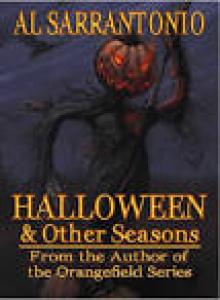 Five World Saga 01 Hornets and Others
Five World Saga 01 Hornets and Others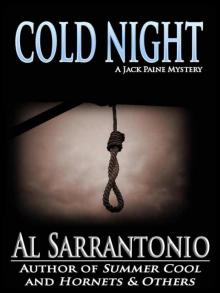 Cold Night (Jack Paine Mysteries)
Cold Night (Jack Paine Mysteries)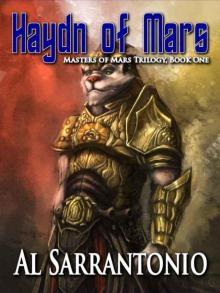 Haydn of Mars
Haydn of Mars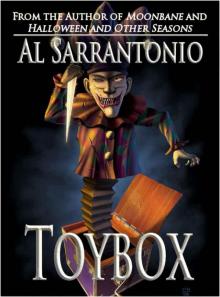 Toybox
Toybox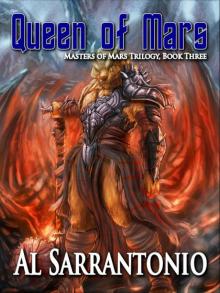 Queen of Mars - Book III in the Masters of Mars Trilogy
Queen of Mars - Book III in the Masters of Mars Trilogy Exile
Exile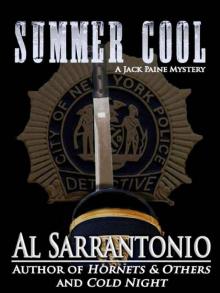 Summer Cool - A Jack Paine Mystery (Jack Paine Mysteries)
Summer Cool - A Jack Paine Mystery (Jack Paine Mysteries) Return - Book III of the Five Worlds Trilogy
Return - Book III of the Five Worlds Trilogy The Orangefield Cycle Omnibus
The Orangefield Cycle Omnibus Summer Cool jp-2
Summer Cool jp-2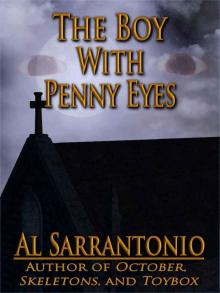 The Boy With Penny Eyes
The Boy With Penny Eyes Journey - Book II of the Five Worlds Trilogy
Journey - Book II of the Five Worlds Trilogy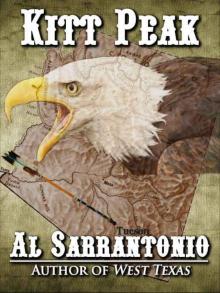 Kitt Peak
Kitt Peak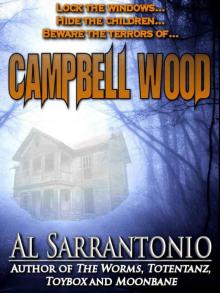 Campbell Wood
Campbell Wood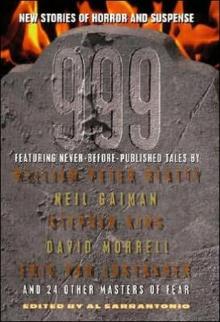 999
999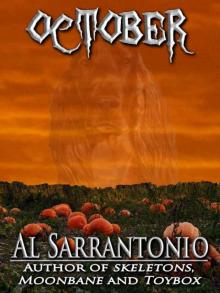 October
October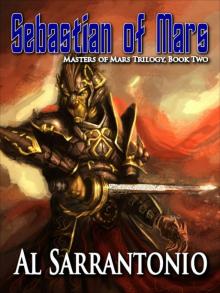 Sebastian of Mars
Sebastian of Mars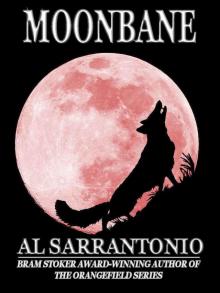 Moonbane
Moonbane Totentanz
Totentanz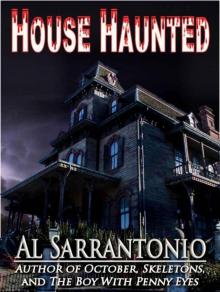 House Haunted
House Haunted Halloweenland
Halloweenland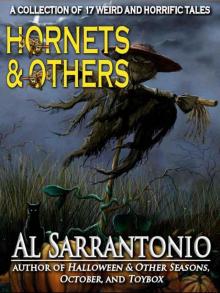 Hornets and Others
Hornets and Others